“Conversations with Dead People,” by Jane Espenson and Drew Goddard
Angie Hart is singing at at the Bronze, providing moody background music as we check in with a few—but not all—of the Scoobies. Mere meters from the emo-music, at the bar, Spike nurses a beer. Elsewhere, Buffy hunts vampires in a cemetery, Willow studies in a library (showing an unusual lack of zest for what was formerly one of her all-time favorite activities) and Dawn arrives home to a “sorry we’re gone, don’t eat pizza,” note. Affixed to which is pizza money.
As the montage wraps up, Buffy finds a fresh grave. A hand claws at the air: someone’s trying to get out. “Here we go,” she says.
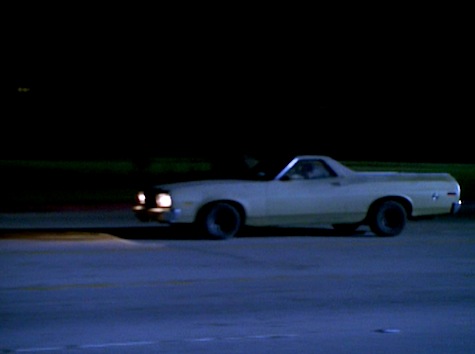
Elsewhere, Jonathan and Andrew are driving back to Sunnydale. Andrew has a plan, which partly involves being back in town so he doesn’t have to master Mexicoan, a language he finds more difficult than Klingon. More to the point the semi-evil duo are having nightmares, and their dreams feature a Spanish variation on the lately trending evil slogan: “From Beneath You, it Devours.” Yes, the First’s reach does extend beyond national borders.
Of course, we’ve seen its minions dispatching Potentials all over the world, so that isn’t really news.
As they pass the Welcome to Sunnydale sign, which is still currently upright, we see Buffy and the vampire punching each other in fine mortal enemy form. Dawn, meanwhile, is being uncharacteristically adorable as she tries to entertain herself with forbidden pizza and microwaved marshmallows. Later, she moves on to playing with her sister’s clothes and weapons.
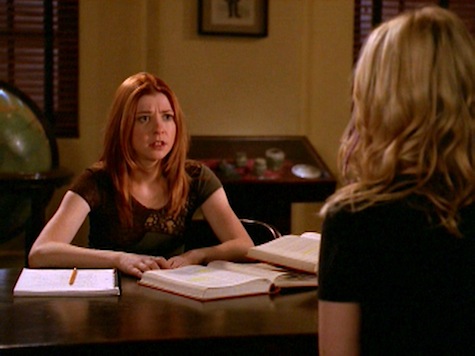
Elsewhere, in my version of events, Anya is taking a flamenco class and Xander is having a rare SAT-phone catch-up with Riley, the two of them having agreed previously that they need more man-friends.
Everything seems to be moving at rather a slow—for BtVS, anyway—pace when Cassie Newton, the doomed, dead kid from “Help,” appears in the UC Library. She says Tara asked her to come have a chat, which more or less ensures that she has Willow’s full attention.
Still pretty low-key, right? This episode is terrific in the way it notches up the intensity in itsy bitsy increments. Back at the house, Dawn is on the phone with a friend, watching TV, when she hears a thumping noise. The front door blows open, and then sound comes blasting through the formerly muted television. Even when she unplugs it, the monster movie soundtrack continues to play. Finally Dawn takes the axe to all the household electronics. The microwave explodes, and she gets glass in her feet. She’s about to start on the portable boombox when it speaks with the voice of Joyce.
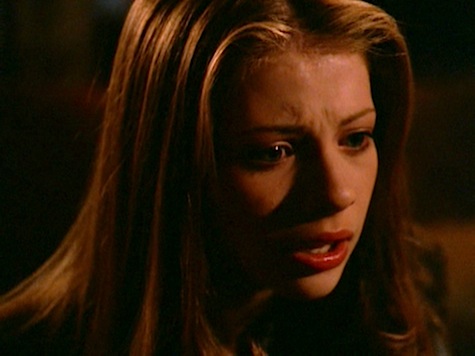
“Mom?”
The disposable vampire of the week, Holden “Webs” Webster, is making out better than the usual newborn vamp in the graveyard fight against Buffy. When he recognizes her, he decides he wants to catch up. This is tougher than he thinks because it takes a good long while to get her to recognize him at all, but they do finally fall into a bit of chit-chat. He’s been taking psychology at university, and pounces on a comment of hers about not being overly connected. To evil, she meant, but the guy is obviously an extrovert, and it’s a conversational in, so he pursues it.
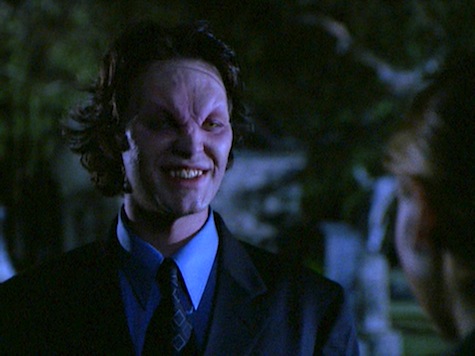
An interruption at this point might have been welcome, and Dawn is trying to phone, but Buffy dropped her cell phone in the fight. Instead of trying Willow, Xander, or Anya, Dawn tries to get the radio to talk like Mom again. As she does, we see an uber-creepy shot of Joyce, dead on the couch.
This portion of the three-pronged storyline is, if you ask me, genuinely spooky.
But everyone’s having a crummy night, in their own way. Willow learns she can’t talk to Tara directly because of the whole flaying of Warren thing. Buffy gets amateur therapy, and Dawn gets terrorized by, as far as she can tell, the ghost of her dead mother. She refuses to flee in terror, though, instead working out a code for the thumps that continue to wham their way from the house. Once for yes, twice for no. Is that you, Joyce? One thump. Is there a scary, slavering home-destroying beast with you? Two thumps.
Jonathan and Andrew have by now Mission Impossibled their way into the high school. Wasn’t the old school perpetually unlocked? Robin Wood must like to keep his hatches battened. The ex-villains are looking for proof that the school contains something called the Seal of Danthazar. The plan is to alert the Slayer to the danger it presents, help her destroy it, and thereby become Scoobies. This may be a rather flimsy and unrealistic hope, but Andrew dangles the possibility in front of Jonathan, like a Snickers bar.
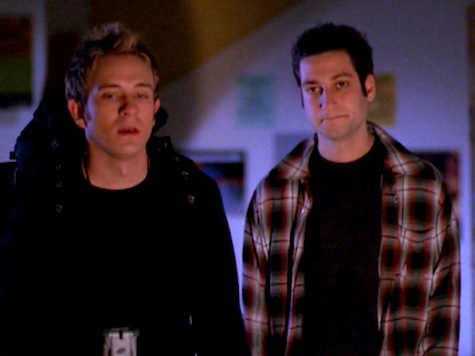
They split up, and when Jonathan is out of sight, Warren appears. He and Andrew are up to something. Business as usual, in other words. It’s only a shocker because of Warren’s terminal exfoliation at Willow’s hands.
Speaking of Willow, she’s telling Tara, via Cassie, all about her grief, and how it’s not getting better. The reply? She’s strong like an Amazon. Buck up, in other words. Buffy’s also spilling some gut, telling Webs about her romantic failures, her father’s contribution to her parents’ divorce, and putting up with guff about whether she has an superiority complex.
She tells him about behaving badly toward a guy, meaning Spike, and when her guard’s down Webs smashes her with a statue and tries to eat her.
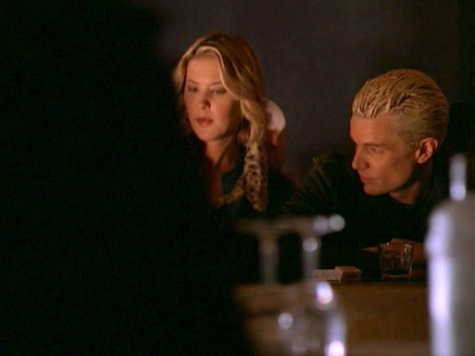
(Speaking of Spike, he’s quietly having his drinkie when a blond joins him at the bar.)
Back at the Summers house, the thing that is menacing Joyce tries to scare Dawn right out of the building. This storyline features a BtVS rarity: not only is it tightly written and scaretastic, but Dawn is rather awesome. She refuses to abandon Mom’s ghost. More than that, she cracks open the magic books and gets her spell on.
As Jonathan and Andrew root around in the ever-changing high school basement, looking for the seal, Warren points the way. They reach the spot and start digging.
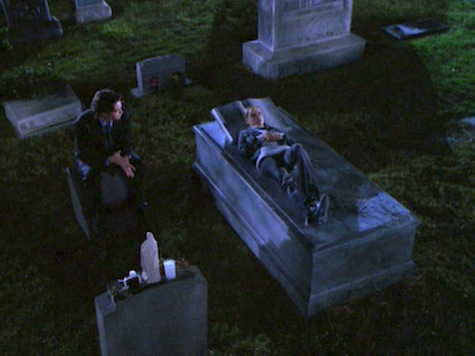
Webs is digging too, in the psyche of the Slayer. He strikes a deal with Buffy that leads to her talking, even more honestly, about Spike. The idea is that after she’s unburdened herself about her remoteness from her friends and her vampire-dating ways, the two of them can fight to the death without unnecessary emotional distractions.
The mention of Spike gives us a chance to see him walking home with the blonde he picked up. Did anyone wonder: what’s he doing picking up women in a bar?
Over at the UC Library, Willow asks if Tara knows about the flaying of Warren. She knows, all right. The power is bigger than Willow, Cassie says, more than she can manage. She declares Willow has to stop using magic altogether unless she wants to kill everyone.
Hey, wait! Giles said quitting’s not the answer!
(Oh, yeah. And Anya is hanging out with Hallie, who’s hinting strongly that she should liquidate her investment portfolio. Xander… who would Xander get? A visit from Dead Gay Larry might be interesting. I don’t want to have to go back all the way to Jesse.)
By now, JonAndrew have the seal uncovered. Jonathan is expressing his nostalgia for high school, and for the people he attended with. Andrew, meanwhile, can still see Warren and is bugging out a little. He breaks into a mean “nobody cares about you” monologue that seems a little driven by stress.
But Jonathan is in some kind of peaceful place, emotionally. He says he still cares about the people of Sunnydale. Don’t go being at peace, Jonathan! It’s almost as hazardous as getting back together with Rupert or Willow after a romantic estrangement.
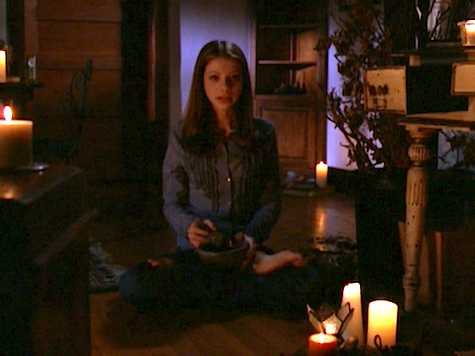
Dawn has got up the components for a spell to get rid of the thing keeping Joyce from talking to her. It is not impressed, and continues to beat the house to splinters, and her too. It’s doing everything in its power to stop her.
Buffy, down in the boneyard, keeps opening up to Webs, talking about all the badness with Spike and her general feelings of unworthiness and isolation.
Everybody feels alone, he says, because everybody is.
They’re about to fight when she names the “he” she’s been talking about all night. She never actually said Spike’s name, you see. And Webs is all like: “I know him. He’s my vampire Yoda!”
Soully Spike? Eating and siring? What about the chip? Never! He wouldn’t! Oh, wait. There he is, eating the blond on her own front porch.
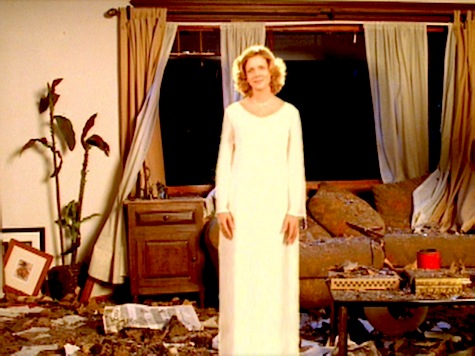
Dawn’s spell is successful, and Joyce turns up in a glowing white nightgown and a beatific smile. (I’m kind of seeing a credit card commercial here, where they tot up the cost of all the things busted: TV, stereo, microwave, couch, fridge, stove, walls, ceiling, plumbing. Visitation from your dead mom? Priceless!)
Willow, meanwhile, is quizzing Cassie about how can she quit magic, in defiance of what Giles and the coven in England have taught her. Cassie, like any death-obsessed poetry-writing would-be-Goth teen, suggests suicide. This is taking it too far. Holy moley, Willow thinks, could there be some lying and villainy afoot?
I suppose a reason Anya isn’t in this episode, besides time constraints, is that she would start asking the hard questions much sooner.
Dawn, for example, believes Joyce when she says: “When it’s bad, Buffy won’t choose you. She’ll be against you.”

Cassie and Willow are squaring off now: Willow asks who she works for and gets a threatening monologue, little in the way of useful info, and a creepy special effect as Cassie’s face slides in two different directions. We see a maw and she vanishes into it.
Isn’t it interesting that the big villains come looking for Willow now? How far we’ve all come from the days when everything was all, “Really? There’s a slayer in town? Let’s kill her so she can’t mess up our plans or our outfits.”
Spike throws away the blond, having had a good nosh. Buffy, noting that her hour is up, reduces Webs to dust. If he’d had a different sire, it might have been worth it to chain him up and have him take a stab at offering therapy to the Gibbering William version of Spike, but the conflict of interest and monster on monster dynamics would be pretty hard to get past on both sides.
Down in Spike’s former digs, Andrew stabs Jonathan, feeding the seal with his blood. Goodbye, Jonathan! I adored pretty much every frame of you on this show, and I love that Danny Strong is winning Emmy awards and penning Hunger Games movies now.
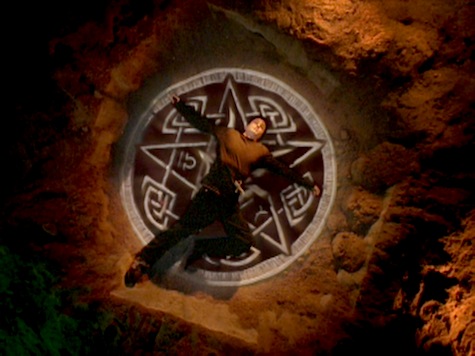
As for you, Andrew, we’ll just have to hope you suffer later. Or, better yet, sooner.
Next: Spike is multi-faceted, okay? And, also, possibly, brainwashed.
A.M. Dellamonica has a book’s worth of fiction up here on Tor.com! Her ‘baby werewolf has two mommies,’ story, “The Cage,” made the Locus Recommended Reading List for 2010. There’s also “Among the Silvering Herd,” the first of a series of stories called The Gales. (Watch for the second of The Gales, “The Ugly Woman of Castello di Putti”!)
Or if you like, check out her sexy novelette, “Wild Things,” that ties into the world of her award winning novel Indigo Springs and its sequel, Blue Magic.










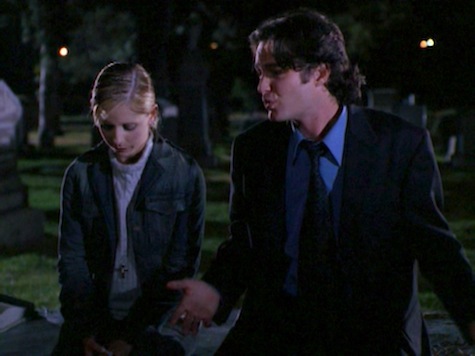
I loved Dawn in this ep. Very well done, and it’s always nice to see kids growing up and getting stronger.
Other random thoughts:
1 – “terminal exfoliation” = awesome
2 – I was also very sad to see Jonathan go, especially in such a treacherous way.
and 3 – The freeze-frame of Cassie = nightmare fuel. When I wake up screaming at 2am, Alyx, guess who I’m going to call? Well, not you, since your number’s probably unlisted, but if it wasn’t, well…
4 – Happy Holidays, Alyx and fellow readers!!!
Aw, Jack, that’s almost sweet. My phone is actually so magical, it doesn’t ring at two in the morning, even if I forget to shut it off!
Have a terrific holiday!
If you have an iPhone and have it on Do Not Disturb…
… well, that can be gotten around. The person just has to call you back within 30 seconds. Then it will ring. I found this out myself the hard way.
Danny Strong is now winning Emmy awards for his screen writing.
See, kids. This is what happens when you get eaten by the Hellmouth.
Run along and toss yourself in.
Remember, during our discussion of Superstar, when we were, like, Spike understands this JONATHAN, why can’t you?!? Andrew makes Jonathan look like Nelson Mandela x Albert Einstein by comparison. Have I mentioned how much I hate Andrew?
Buffy’s line (re: Spike)
“The way I treated him…His love for me was sick.”
has stuck with me all this time. IMO, it shows just how reluctant she’s been to accept and deal with what happened btwn them.
Here’s a quote I wish I’d run across earlier in our discussions:
“Projection [of our own shadow] makes the whole world a replica of our unknown face.” Carl Jung
It also makes me think of this exchange btwn Buffy and Willow (Beauty and the Beasts), re: abused girlfriend Debbie –
Willow: “I think we broke her.”
Buffy: “She was broken already.”
I’ve commented before on the parallels I see between Bangel and Spuffy (with the gender roles reversed). Bangel was also an obssessive, unhealthy relationship, just in a more traditional way. Buffy even goaded Angel into biting her after Faith poisoned him. I believe that the physical scar she bore from that represents the emotional scars Angel gave her. Really, if anyone should’ve stayed dead….Plus, Parker was pretty much Angel with a pulse.
And then there’s this, from Joss:
“Although Spike could feel love, it was the possessive and selfish kind of love most people feel. The concept of real altruism didn’t exist for him. And although he did love Buffy and was moved by her emotionally, ultimately his desire to possess her led him to try and rape her because he couldn’t make the connection – the difference between their dominance games and rape.”
Is that what he means by “sick?”
BTW, Buffy beating the ever-loving cr*p out of Spike in Dead Things was hardly what I would call a game.
Then you could add in the Luke & Laura thing, too. Joss has commented that he found that situation “disgusting.” I was never a fan of General Hospital, but I understand it was three seasons between Luke’s rape of Laura and their wedding (yeah, like I say, not a fan).
Still,
1. It’s a soap opera. Outrageous is pretty much a given.
2. Presumably, Luke did something to redeem himself over that time.
As for Spike winning back his soul, there’s this:
“In order to wish for more self-awareness, one has to possess enough self-awareness to know one is lacking in self-awareness, which makes the wish superfluous.” A comment from the Esquire politics blog, and a fine example of Catch-22.
A recent episode of Grimm serves to remind us that even Christmas has a dark side (Krampus, who punishes/eats naughty children). So on that note, I’d like to second Jack’s Happy Holiday! wishes for Alyx and all the rest.
Script/Word of God is that Xander is handing out with Jesse from Season 1, Episode 1. Xander’s absence and Willow talking to Cassie were both due to issues with the actors. They couldn’t get Jesse or Tara to make appearances.
Presumebly Xander’s conversation would be about how much he needs to step out of Buffy’s shadow and not be the useless extra of the group, some combination of a reverse Season 5 Watcher ridicule and Spike’s stunt in Season 4.
Haven’t heard about Anya but I’d have to imagine your guess is right. I mean who’s dead that Anya would even care to talk to other than Halfreck? And would that conversation really go more than five minutes before Anya just demands to know who she’s really talking to?
In terms of the actual episode. I call Kudos on the First’s actions, Tara trying to push Suicide would have been even more of an alarm bell than Cassie, so a surrogate works. For Dawn, I think Dawn wouldn’t really take Mom’s advise if it was just given, but Mom imparting words of wisdom after she’s been saved by her heroic youngest daughter? That’s a bit more believable.
I’ve always felt the same way about Spike’s odd desire to get a soul, Dianthus. In fact, until the show started saying otherwise I thought that Spike getting his soul was one of those “be careful what you wish for” things.
First up, Happy Holidays, everybody!
Second up, a big well done Alyx, for a fine job of summarizing this episode.
“Conversations With Dead People” is sometimes overlooked, I think, as one of the best of the ‘format-buster’ episodes that are almost always a signal of BtVS at its best as a show. As I’ve mentioned a couple of times before, it’s my pick for the second-best episode of the last season, and proof positive that even at this point in the show, the writers were still capable of pulling out all the stops and making it work.
The central conceit of the episode – to juggle five separate storylines revolving around Buffy, Willow, Dawn, Spike, and the Trio in which none of the main characters ever meet or interact with each other, and which ostensibly occur more or less simultaneously (note that this is the only Buffy episode which opens with a title card, and a time/date) – sounds terribly awkward when expressed thus on paper, and yet somehow it works.
Despite the fact that all five of the sub-plots work very well, and are each worthy of attention for reasons that Alyx summarizes very well in the post, I always think of this one as being very much a Buffy episode. The segment devoted to her meeting with Holden Webster forms the backbone of the episode, and for reasons that go beyond it being the only one that isn’t part of the introduction for the season’s Big Bad (instead, it’s about the heroine). It’s another example of what I always say is the biggest strength of this season: wonderful character work that’s built on the accumulated history of the characters up to this point in the show.
Big kudos has to go to the actors for making it work. The role of “Holden Webster” could very easily have come off as cheesy (“Psych 101 alert” snarks Buffy, who took that class), but it doesn’t, and a big part of the credit for that goes to Jonathan Woodward for taking this one-off character, and imbuing it with intelligence and geniality, resulting in one of my favourite MOTW’s to appear on the show. Sarah Michelle Gellar is also (typically) fantastic. Throughout the long, twisting, and meandering conversation she manages to slide gracefully around every curve as it swerves back and forth between comic small talk and dark, confessional monologue. All the while, she works in lovely little small touches – notice how she starts fiddling with her crucifix whenever the conversation starts getting uncomfortable? – that help give these scenes a lot of their sense of intimacy.
Above all though, it’s the writing that really makes these scenes. Jane Espensen and Drew Goddard are credited as the writers for this episode, but the Buffy segments were almost entirely written by Joss Whedon (no surprise). Whedon also wrote the main song for this episode, “Blue”, and it’s another one of my favourites from the show. Apart from sounding lovely and haunting, and doing great for the mood of the episode (notice how the song, at both beginning and end, intersects with the use of blue moonlight – the central motif of the Slayer?), the lyrics acts as a guide to Buffy’s emotional development over the show up to this point, seeming to evoke many of the key emotional points of her life in Sunnydale.
(For a great breakdown of the song along these lines, see here. There’s also a brilliant extended analysis of the song in this review of the episode.)
Ultimately what this conversation revolves around is giving Buffy a chance to lay her emotional cards on the table, for the benefit of the audience. Needless to say, this is no small thing. It’s arguable that within the space of this single episode, Holden manages to elicit more information about Buffy’s self-image and her view of her relationships than all of her conversations with Willow, Xander, and Giles in the previous three seasons combined. There’s a very good reason for this, one that was beautifully summarized, I think, by another commenter:
That’s where Holden comes in.
Their conversation ends up delving into a lot of different subjects, including her friends, boyfriends, parents, past, duty, God, sex, death and vampires. A lot of it is stuff that we might have guessed or suspected from previous episodes, but that doesn’t make it any less fascinating to finally hear it confirmed in her own words. The interspersment of small but poignant revelations – she thinks her dad cheated on her mom, and that’s why they split up; she’s skeptical about the existence of God, despite having been to Heaven – with big, development-heavy ones – pretty much everything that gets brought up about Spike, not least (including this heavy line: “And the joke is… he loved me. I mean, in his own sick, soulless way, he really did care for me. But I didn’t want to be loved.“) – all adds to the effectiveness of the way these scenes drive for an answer to what the missing piece of the puzzle is that Buffy needs to complete her self-actualization so that the show can have its ending.
Not surprisingly, it’s talking about Spike that leads Buffy into her major bit of self-realization:
“I have all this power. I didn’t ask for it. I don’t deserve it. It’s like… I wanted to be punished. I wanted to hurt like I thought I deserved. … I feel like I’m worse than anyone. Honestly, I’m beneath them. My friends, my boyfriends. I feel like I’m not worthy of their love. ‘Cause even though they love me, it doesn’t mean anything ’cause their opinions don’t matter. They don’t know. They haven’t been through what I’ve been through. They’re not the Slayer. I am. Sometimes I feel… this is awful. I feel like I’m better than them. Superior.”
Brilliant stuff. That’s what brings us to the crux of what this season’s All About for Buffy. I defer again to a fellow commenter who shares my opinion but can express it more eloquently than I could:
“The point of this squirrelly aside is that being the Slayer has always caused Buffy some degree of alienation, but by Season Seven the way this manifests has evolved significantly from Season One. The problem with Slayer duty is no longer, say, that it is a chore that prevents her from hanging out at the Bronze on Friday night, or that patrolling cemeteries is not a great place to meet normal boys. Holden’s bummer of a conclusion is less helpful than his clinical assessment: “You DO have a superiority complex, and you’ve got an inferiority complex about it.” It’s something he spotted early on, and has been prodding Buffy to admit to herself. So yeah, it’s lonely at the top and nobody understands, but now it’s making her neurotic. You tend to develop messiah complexes when you have sacrificed your life to save the world; and Holden points this out and suggests it these feelings are kind of to be expected (“who could live with that for seven years and not feel superior?”). It’s making her hard. It’s making her unkind. Unlike Angel, Buffy operates under no edict to help the helpless. Her mission statement is simply to “stand against the vampires, the demons and the forces of darkness.” There’s nothing about life, liberty, or the pursuit of anything in there. Being the Slayer is finally turning her into a Slayer.
Angel’s Soul Thing is designed to torture, punish, and possibly to take the vampire out of commission, but his conscription by The Powers That Be instructs him to make meaningful connections with humanity. Buffy’s task as the People’s Warrior is to combat evil, but tradition instructs her to forgo personal relationships. There actually was a “guidebook” (Giles didn’t give it to her) and a Council (she fired them). This is a Slayer waaaay off Standard Operating Procedure. The conflicts laid out above play out across Season Seven in interlocking threads. Buffy as Leader, general of an army of allies and associates, is in conflict with the lone wolf element of the Slayer paradigm — how can you lead, when part of you thinks you don’t need your followers? Buffy as The Law, the Slayer as judge, jury and executioner, has always had to deal with the reality that any time, any place, she may have to kill someone she cares about in the line of duty. The first time she did it, stabbing Angel before a portal to Hell (See under: Andrew & Jonathan), it marked her for life, and she couldn’t do it again. And so she could not sacrifice Dawn, tried to domesticate Spike, and dithered too much as Willow fell into shadow. After last season, she can’t do that again, and two episodes ago ran a sword through the relapsed Anya without hesitation. It’s always different!” (link)
(continued in next comment)
How Buffy winds up dealing with all of this is basically what I think most of the rest of the season is about.
There’s an increasing tendancy as the season goes on to creep into metafiction at times, something that’s especially worthy of discussion when we get to “Storyteller”.
For now though, it’s fitting that the episode ends with the focus being abruptly shifted to Spike, since his relationship with Buffy (which will finally get its proper re-beginning in the next episode) will ultimately be key to where both of them end up by the end of the show.
@8.
In a way, it was. Gaining a soul (and thereby the ability to feel guilt for his past actions) was precisely what made Spike vulnerable to the influence of the FE.
@5.
Actually, the dialogue here (along with the follow-up in “Never Leave Me”) is a firm indication that Buffy has accepted what happened between her and Spike, and is dealing with it very well, all things considered.
As for the soul argument, your Catch-22 point doesn’t really jibe, because it’s obvious that the importance of a soul stems from something far more significant than mere awareness, and in any case it doesn’t really apply to Spike, whose eyes had to be forced open by events before he realised how limited he was sans-soul.
The nature of exactly what a soul is on the show is left deliberately ambiguous (better that way for storytelling purposes), but it’s clear that it is essential to the moral stuff of humanity. Spike without a soul could love Buffy, but he could never appreciate many of the most important aspects of who she is as a person, and thus in an important sense was more in love with an idea of her that did not really match the reality (from her end, Buffy had a not dissimilar problem in relating to him).
His love for her really was “sick” in the sense that it was filtered through this limited awareness: throughout Season 6 he was completely blind to the ways in which he was “killing” her through their relationship, which was why in the end it fell to her to end it, and resist him when he tried to resume it.
Hence what I see S7 Buffy/Spike as revolving around: finally coming to understand each other for the first time.
I kind of like how the first character to, mentally and emotionally, move past high school is the one who had the worst experience. Jonathan was so low on the social hierarchy that Willow used him for a verbal punching bag. He tried to overcompensate for low self-esteem by making himself the hero, then by becoming a villain, and here he is with a little bit of inner peace.
Speaking of high school it was nice to see this episode and the episode before dealing with that a little. In this case Buffy comes face to face with how much of her isolation was of her own making. Previously Xander clued into how out of sync his image of himself from high school (loser that a jock uses to hold their gum) is with current reality (he’s running a construction crew and the jock is out of shape and delivering pizza).
Probably Synder locked the doors to the old high school. The school librarian would have his own key. Most of the baddies who turned up tended to do it during events with open doors (prom, homecoming, parent teacher night, etc.) or had been there often to learn the tricks of how to break in (Angelus).
The screen capture of Cassie reminds me how glad I am that Amber Benson didn’t appear in this episode. I’m pretty certain that Tara’s last on screen appearance being her swallowing her own face would have messed with how the character is remembered.
Have a good holiday.
I love how the threads of this season are set in place so strongly here.
What is making Buffy weak? Alienation and seperation
What makes her strong? Bonding with others.
The fight with the First is an ideological fight more than anything. It’s about what kind of people will we be. The fight against Angelus, where the only thing Buffy needed was herself, was NOTHING compared to what’s coming. Angelus wanted to end the world, the First wants to remake it.
And as frustrating as the comics were to some people, I loved how consistent they remained with Buffy’s actions.
Buffy created a legion of Slayers to bond with, but because they came together as an army, she could never stop being the general, being above, alone, isolated, alienated. And when something else comes along to remake the world, that loneliness and isolation has terrible consequences.
I agree.
The First as a Big Bad is emblamatic of season 7 as a whole, in the sense that from a thematic viewpoint it’s very well constructed as a close for the series. As a metaphor, it quite perfectly embodies the character issues that get raised in this episode, and it’s thus fitting that it spends more time as Buffy than any other guise. (First!Buffy is always a delight to watch, even when she does nothing except chew scenary, in large part because SMG completely owns that role).
However…
The thing is that while s7 is strong thematically, those strengths are undercut by its dramatic flaws, and the First is an excellent example of this.
This episode does a brilliant job of introducing the FE as the Big Bad of the season, and the subsequent three episodes do very well in elevating the threat that it seems to pose. It’s what comes next that’s unfortunate. After “Sleeper”, the audience gets told that the First has temporarily gone into “remission” (say what?) as an explanation for why it does almost nothing for a space of three episodes or so (except to sic Robin Wood on Spike, which was clever) – obviously code for the writers having run out of ideas for what it could do until the main plot picks up again in “Get It Done”. Then Caleb shows up, and while he’s great on his own terms as a dangerous threat for Buffy to defeat, his placement in the season is odd – he smacks of being the Little Bad taking over from the Big Bad, instead of the other way round. The net result is that the First, despite being a great idea for a Big Bad, never really feels like a successful villain, in the way that Angelus or the Mayor did.
Season 7 suffers from the same problem that s6 did: a mid-season ‘episode drought’ that drags down the rest of the season and causes it to feel weaker than the sum of its parts ought to make it. The drought isn’t as bad this season – “Showtime”, “Potential”, “The Killer in Me”, and “First Date” aren’t really bad episodes, especially not when compared to the low-points of s6 – but the good parts of the season aren’t as strong either. Although “Selfless”, “Conversations With Dead People”, and “Lies My Parents Told Me” are all really excellent, they’re not on the same level as “Once More With Feeling”, “Dead Things”, or “Normal Again”.